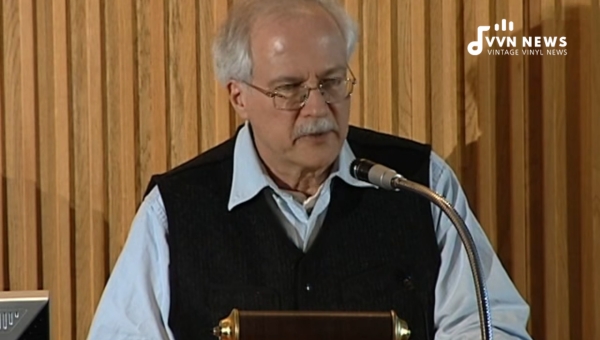If you’ve ever found yourself thinking, “What does an ethnomusicologist do?” then you’re about to embark on an intriguing journey into a rich and multifaceted field.
Essentially, ethnomusicology is the study of music from the cultural and social aspects of the people who make it.
It’s a fascinating area that delves into how communities around the world use, understand, and experience music.
From formative memories to cultural identities, from village festivals to bustling cities, music permeates every corner of our lives. This is what draws me towards this captivating study that continually unfolds just how intrinsic this art form is to human existence.
So let’s embark on this journey together as we unravel the intricate web of what ethnomusicologists do!
What is Ethnomusicology?
Ethnomusicology is an interdisciplinary field that intertwines music, culture, and sociology.
It dives deep into exploring the cultural backdrop behind the creation of music, its social impact, and the entire experience of the community creating it. Ethnomusicologists don’t restrict themselves to just one type or variety of music.
They roam worldwide to research on anything from indigenous tribal chants to contemporary pop music.
They pull out their magnifying glasses, examining the cultural influences behind the creation of a piece of music and how it affects those who listen to it.
This is more than a purely scholarly pursuit; ethnomusicology seeks to help you understand music’s role as a key element in societal expression.
Through this captivating study, you’ll realize how soundscapes shape, reflect, and even challenge our realities in profound ways.
What does an Ethnomusicologist do?

Ethnomusicologists are the detectives of the music world, they unravel the influences, motivations, and impacts of music within various cultures.
Their studies often encompass a wide array of tasks.
Primary Research
The core aspect of their work involves primary research. This could be fieldwork that requires them to travel and live among the community they are studying. This immersion allows them to witness firsthand the role music plays in day-to-day living.
They take part in musical events or practices, interview musicians and audiences, and capture audio and video recordings, all in a bid to probe deeper into the cultural significance and nuances behind every note.
Analyzing Data
Data analysis forms another integral part of their job. Ethnomusicologists decode their findings from the primary research stage by transcribing scores, dissecting lyrics for cultural metaphors, or even statistically analyzing audience responses.
Teaching
Many ethnomusicologists are employed by universities where teaching or mentoring students on ethnomusicology becomes a part of their responsibility. They also might prepare scholarly papers and arrange public performances to share insights from their research.
These professionals truly weave an intricate tapestry interlinking seemingly disparate elements that ultimately breathe life into our understanding of music as a profound cultural phenomenon.
Also Read: What Is Programme Music? [Exploring Narrative In Symphony]
Core Skills Required for an Ethnomusicologist

An ethnomusicologist requires a wide spectrum of skills, each uniquely contributing to the different aspects of their job role.
Here, let’s explore five primary skills essential to thrive in this field.
Communication
Effective communication is at the heart of ethnomusicology. This involves good listening skills to understand various forms of music and articulate verbal skills to communicate findings in an accessible way effectively.
Strong written communication is critical for writing detailed reports, research papers, or even educational materials.
Moreover, they often need proficiency in more than one language, as they frequently work with diverse cultures worldwide.
This multilingual ability amplifies their potential to study music from various parts of the globe comprehensively.
Musical Abilities
While it may seem obvious, solid musical abilities are indeed crucial for an ethnomusicologist.
Understanding musical theory and having practical musical skills can greatly help them comprehend the music they’re studying at a deeper level.
This means being able to analyze different rhythm patterns, patterns, structures, and harmonies is vital while engaging with different kinds of music from diverse cultural backgrounds.
It’s noteworthy that one doesn’t need to be a virtuoso musician to make a good ethnomusicologist. With time and diligence, aspiring ethnomusicologists can cultivate and enhance their musical abilities.
Analysis
Ethnomusicologists analyze music against the backdrop of society and culture making analytic skills essential in their toolkit.
They are required to draw connections between disparate pieces of data; connecting music with historical events or cultural shifts which requires keen interpretative prowess and complex reasoning abilities.
This analysis extends beyond purely musicological critique—it combines elements from social anthropology, cultural studies, and even psychology in its scope!
Research
An accomplished ethnomusicologist should be well-versed in proper research methodologies to conduct fruitful investigations into complex areas regarding music culture and society.
They typically engage with both qualitative and quantitative research, interpreting data through methods such as participant observation or statistical analysis.
Ethnographic fieldwork is often integral to their research which could range from local communities closer home or remote regions across continents!
Cultural Sensitivity
Cultural sensitivity is paramount when studying different ethnic groups’ music worldwide—this respect allows locals to warm up more readily sharing valuable traditions that would otherwise remain inaccessible.
As an ethnomusicologist ventures into far corners of societies, one may confront customs that appear strange when seen through a Westernized lens—it’s here that cultural sensitivity plays a vital role.
They learn not just to tolerate but truly appreciate these cultures for what they are—islands richly steeped in tradition.
Also Read: What Is Reverb? [An In-Depth Guide For Audio Enthusiasts]
Education and Training for Ethnomusicologists
Becoming an ethnomusicologist calls for an in-depth understanding of both music and social sciences.
To put it differently, this journey includes substantial coursework in music theory and history as well as anthropology, cultural studies, social science research methods, languages, and more.
- Undergraduate Degree: Most ethnomusicologists start their academic voyage with a Bachelor’s degree in Music or related disciplines. Students receive foundational knowledge in music theory, performance, ear training, and composition, and the beginning of exposure to areas like world music cultures.
- Graduate Degrees: For a specialized study like Ethnomusicology, it is often ideal to continue with higher education. Most universities provide a Master’s or Ph.D. degree in ethnomusicology.
- Master’s students generally focus on building research skills and deepening their knowledge about specific world music cultures. Courses may include ethnographic research methods, sound analysis techniques, extensive fieldwork, and regional studies of music.
- Once reaching the doctoral level (Ph.D.), students tend to specialize even further—often focusing on geographical region-, genre-, or issue-specific research related to world music studies. Scholars at this stage work intensively on a narrowed topic that contributes new knowledge or insights to the field of ethnomusicology under the guidance of experienced faculty advisors.
Several highly reputed universities offering programs in ethnomusicology include:
- University of California, Los Angeles (UCLA) – [The Department of Ethnomusicology]
- Indiana University Bloomington
- Harvard University
- University of Texas at Austin
- University of Washington
Becoming an ethnomusicologist is not just about education but also about experience.
Direct interaction with different cultures’ musical practices is crucially important so expect lots of practical fieldwork during your studies.
Be ready to embark on this compelling exploration which allows you a closer look at diverse global sonic landscapes!
Careers in Ethnomusicology

There is a diverse array of careers that an ethnomusicologist might pursue. Let’s explore some of the principal professional paths that this academic discipline can lead you to.
Academic Careers
Ethnomusicologists often choose academic careers, whether as professors in universities, lecturers in colleges, teachers in schools, or researchers at various cultural institutions.
They offer courses on global music traditions and their social & cultural contexts.
Their work often involves writing scholarly articles, conducting field research, and contributing to the academic community’s body of knowledge. Here are a few academic roles they might fill:
- University Professor: Teaching classes on music theory, global music traditions, and more.
- Professional Researcher: Conducting extensive field research and publishing findings to contribute to the discipline’s knowledge base.
- Music Critic: Observing and providing insights into music trends and phenomena.
Music Industry Careers
Not all ethnomusicologists confine themselves within the walls of academia. Many traverse the complex landscape of the modern music industry—ranging from artist management agencies to record labels.
- Talent Scout: Finding new talent from different cultural backgrounds for recording labels.
- Artist Manager: Working with musicians from diverse cultures to help manage their careers.
- Record Label Executive: Employing an understanding of various music styles to make decisions about artists and repertoire.
Cultural Institutions
Alternatively, an ethnomusicologist might find themselves working within the realm of public musicology — taking up positions in museums, libraries, or other key cultural institutions:
- Librarian or Museum Curator – Ethnomusicologists with these roles utilize their unique understanding of musical culture to preserve relevant artifacts and educate others about them.
- Archivists – They catalog and preserve musical documents, recordings, and other valuable musical artifacts for future generations to study.
Additional Careers and Opportunities
In addition to the roles mentioned above, there are numerous other careers that ethnomusicologists can pursue.
These are highly dependent on the individual’s interests and specialization in ethnomusicology.
- Performance Artist – Many ethnomusicologists are trained musicians themselves and can enjoy a career as performers of traditional music or incorporate their knowledge into innovative compositions.
- Music Journalist – An in-depth understanding of music from around the world can make an ethnomusicologist a great candidate for writing about global music trends, reviews, or artist profiles.
Also Read: How Does MP3 Compression Work? [Lossy vs Lossless Compression]
Workplaces for an Ethnomusicologist
Ethnomusicologists have numerous career opportunities due to the interdisciplinary nature of the field.
Below are the primary workplaces for an ethnomusicologist to consider:
Musician Advocacy Groups
Ethnomusicologists play a crucial role in musician advocacy groups. They work out strategies to promote and protect the interests of musicians, mainly those from marginalized communities or non-mainstream genres.
These professionals provide valuable insight into cultural and traditional music forms, helping to elevate these less-known art forms on both local and global platforms.
Research Facilities
Places like research institutes or think tanks often house ethnomusicologists. Here, they conduct in-depth studies into various aspects of music creation, perception, cultural significance, etc. The researchers derive valuable insights that contribute immensely to our understanding of the music world.
Arts Organizations
These entities integrate various aspects of art forms, including music, such as performances, exhibitions, and education. Ethnomusicologists here take up roles as curators or educators explaining the cultural context behind various musical exhibitions or performances.
Community Outreach
Outreach programs aim to bring cultural awareness and enrichment to different communities. As ethnomusicologists specialize in studying music’s influence on culture and society, they prove instrumental in devising strategies for these outreach programs, including workshops, lectures, and interactive sessions emphasizing local musical traditions.
Educational Institutions
Colleges and universities are common workplaces for ethnomusicologists who often engage in academic roles such as professors or lecturers.
Besides teaching courses related to their expertise in ethnomusicology, they may also conduct research activities or manage projects involving students studying cultural music.
Museums
In museums that focus on cultural history or ethnic heritage, ethnomusicologists are engaged in sensitively curating exhibits that showcase different cultures’ musical history.
They also assist visitors by providing a well-rounded understanding of these exhibits in a meaningful context.
Archives
Archives storing sound recordings rely heavily on the knowledge of an ethnomusicologist to catalog music based on its genre, origin, etc., making it easier for other researchers to locate valuable resources for their study.
Each workplace significantly utilizes the specific skill sets offered by an Ethnomusicologist, be it enhancing cultural understanding amongst communities, contributing towards academia’s growing body of knowledge about world music cultures, or preserving invaluable musical heritage for future generations.
Every institution provides unique experiences while weaving a rich tapestry that makes up numerous fields where an Ethnotherapist is involved, a role that inevitably seeps deeply into unearthing deeper insights about human culture and societal dynamics through the lens of varying world music.
Ethnomusicologists Earnings and Job Outlook

As interesting as a career itself is the earning potential of said career. Salaries for ethnomusicologists vary greatly depending on a variety of factors such as educational background, years of experience, geographic location, and the specific role within the field.
Median Salaries
The U.S. Bureau of Labor Statistics groups ethnomusicologists under broader headings such as Music Directors and Composers or Postsecondary Teachers.
According to their data, as of 2020, the median annual wage for music directors and composers was $51,670, whereas postsecondary teachers earned a median wage of $80,790 annually.
It’s important to remember that this value could vary considerably in the case of researchers or practitioners in specialized areas.
Sector Specific Pay
In a practical sense, ethnomusicologists often work across multiple sectors. Those working in academia likely earn salaries commensurate with their teaching and research roles.
Ethnomusicologists working within non-profits or cultural institutions may have different earning potentials based on fundraising capabilities and budget allocations within these organizations.
Indeed.com estimated that musicologists (a broader category that includes ethnomusicologists) earn an average salary of $55K per year in the U.S., though it significantly increases with experience.
Job Outlook
Jobs for music directors and composers are expected to grow by about 5 percent from 2021 to 2031, according to the Bureau of Labor Statistics.
This growth rate is slower than average for all occupations but doesn’t paint the complete picture for ethnomusicology careers specifically.
Ethnomusicology is highly interdisciplinary with professionals finding opportunities across various sectors like education, cultural institutions, scientific research bodies, or private corporations.
Overarchingly positive job outlook within postsecondary education implies more instructors will be needed for college-level music programs.
Broadly speaking though due to the nature of this field, its growth prospects depend on public interest in arts & culture along with the availability of funding in these sectors which could be subject to fluctuations.
While it may not promise sky-high earnings or explosive job growth rates – ethnomusicology offers unique fulfillment through intellectual stimulation & global learning opportunities that impact human lives & societies positively.
Also Read: What Does An Audio Engineer Do? 2025 [How To Become One?]
FAQs About Ethnomusicologists
1. What does an ethnomusicologist study?
An ethnomusicologist studies the cultural and societal aspects of music from around the world.
2. Where do ethnomusicologists generally work?
Ethnomusicologists typically work in academic institutions but may also be found in cultural organizations, research institutions, or as consultants.
3. Do you need training to be an ethnomusicologist?
Yes, one typically requires a degree in musicology or a related field and additional specialized training in ethnography.
4. Is it necessary for an Ethnomusicologist to play an instrument?
Playing an instrument isn’t necessarily a prerequisite, however, a solid understanding of musical concepts and terminology is essential.
5. Can Ethnomusicology focus on contemporary music styles too?
Absolutely! The ethnomusicological lens can be applied to any genre – be it tribal chants or the current pop sensation.
Conclusion
The world of ethnomusicology is as intriguing as it is expansive. As an ethnomusicologist, you’ll become an explorer of music cultures around the globe.
Whether working in academia, museums, or cultural organizations, you’ll contribute to the understanding and preservation of music traditions and their role within societies.
Ethnomusicology isn’t just about studying music, it’s about recognizing how music, in its many distinct forms, contributes to our collective human experience.
Be it tribal chants or contemporary pop music, let not a single note escape your attention.








